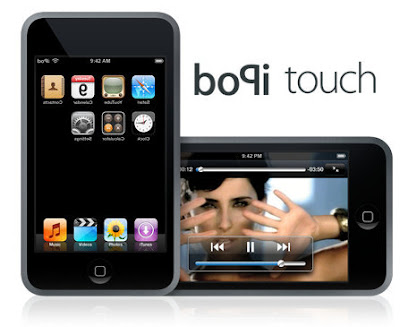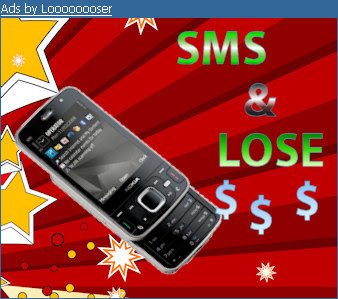
1. Phishing sites & mails.
Have you ever got a mail from Yahoo! or Hotmail (Live Mail) asking you to re-enter your password, or that your account has been disabled & that you need to reactivate it?
If yes, don’t click on it… since it’s most likely a phishing mail!
A phisher site is a fraud site that looks exactly as the original site (& may even work), which intends to steal your login, personal information, etc. Hence the term “phishing.” More on Wikipedia.
 Most phishers attempt to steal your Paypal, bank account, credit card & mail account. However, more recent phishers have instead been focusing on social networking (Facebook, Hi5, Bebo, MySpace) & file-sharing sites (Rapidshare, Megaupload, Megashare).
Most phishers attempt to steal your Paypal, bank account, credit card & mail account. However, more recent phishers have instead been focusing on social networking (Facebook, Hi5, Bebo, MySpace) & file-sharing sites (Rapidshare, Megaupload, Megashare).Internet Explorer 7 & Firefox 2 have quite sufficient protection against phishing, but they are not always effective against the never-ending onslaught of phishers. Phishers can be easily found everywhere! Anyone can download them & it’s really easy to use them!
Here’s a few tips on how to counter them:
- If you notice there’s something wrong with a site (a pixel too much, or an extra line here…) go into Red Alert mode.
- Compare the original site with the suspected “phishing” site. Spot the differences.
- If you want to download a Rapidshare file & the link is hidden in a url-redirection service like tinyurl or linx.in, it’s definitely a phisher.
- If you suspect a site, open up the page source on Firefox & check for urls other than the original website. (Instead of paypal.com, you may see paypaul.com)
- Some phishing sites (especially RS) are so convincing that you are easily fooled. & the phishers are intelligent enough not to change the password. So you should change your RS account password frequently.
- BE A PARANOID!!! (Remember - only the paranoid survives…)
Check out this Microsoft guide as well.
You want to download Phishers? Here’s a whole list of them. [For preview purposes only!]
2. Fakes or clones of products
 I may be wrong, but this resembles something that I may have seen here.
I may be wrong, but this resembles something that I may have seen here.You get these Chinese fakes everywhere & sometimes the fakes are totally indistinguishable from the real thing.
& what’s more amazing is that not only people are fooled into buying but many willingly buy them! They know they are copies of the original products… but they still buy them because they are dead cheap. Well, after 10 days of use, when the products break down, I doubt their line of thought would stay the same… & for some products, it’s not only a drain of money but also a potential danger (exploding battery, lethal chemicals, etc.)
 How to identify fakes:
How to identify fakes:- It’s extremely cheap! A N95 being sold for Rs. 5000 must raise some eyebrows…
- Look for a “Made in China” sticker. (or Maked in China, most probably)
- Check the build quality - if it’s cheap plastic or metal, then you know it’s a clone.
- Check the packaging - Original products come with guarantee labels & manuals. Fakes do not.
- In case of media players, check the UI - it’s freaking ugly!
- Check the model name - If it’s something like USB Pendrive by the name of Sony Playstation, you know it’s a fake.
- Always buy genuine at a genuine retailer. I hate people who buy fakes.
3. SMS Games
 Let’s consider a simple example:
Let’s consider a simple example:There’s this ultra-noob (supposedly) tech show that is sponsored by a rotten apple… They tell you they are giving away a laptop & the only thing you need to do is send a sms, & you’ll be able to take part in the lucky draw! & they explain how they’ve simplified it… there’s no question to answer, you just need to type & send!
They keep repeating the crap every 5 min & they keep forgetting a very important thing… guess what? Oh yes, the price of the sms?
Rs. 1.20?
Rs. 3.00?
Rs. 5.00?
No, it’s a full Rs. 8.70! Who’s the winner now?
Yes, do not believe in sms & phone games. Actually, the game sponsors make double more profit than the product they are giving away. The whole game is only a scam to grab easy money from fools who are intelligent enough to send multiple smses. & they very conveniently forget to mention the price of the sms!
In the above show, the price was NEVER mentioned! It’s as if you are going to buy something, but you can only know the price only after purchasing it? Is that not a scam?
Don’t waste your time or money on these scam games. Chances of winning are nil. If you want something, go & buy it.
4. Fund collection
 Someone knocks on your door & tells you how he got chest pain in his arms & a headache on his toe, how his hair has been paralysed, & finally asks you to help relieve his pain by donating him some money. Another situation would be where a group of people have decided to raise contribution for building a mobile toilet. In each case, they’ll come up with a fake certificate for further emphasis.
Someone knocks on your door & tells you how he got chest pain in his arms & a headache on his toe, how his hair has been paralysed, & finally asks you to help relieve his pain by donating him some money. Another situation would be where a group of people have decided to raise contribution for building a mobile toilet. In each case, they’ll come up with a fake certificate for further emphasis.These are all scams! Actually, door-to-door fund collection is a really profitable business, if you can get a valid enough reason to gain sympathy. People are more than willing to show their greatness. This applies to beggars as well. If anyone is running short of money, I would advise begging - the dividends are extremely high.
Don’t fall in these scams. If you see someone calling for a donation… just say no, or give him peanuts. If you really want to donate something, do it on your own, directly to an NGO.
5. Online Shopping
 When you saw that mobile phone on eBay… you knew it was IT!!! Two weeks later & your virtual (Paypaul) wallet considerably lighter, the package arrives at your doorstep. A brand new mobile fone made from recyclable… cardboard!
When you saw that mobile phone on eBay… you knew it was IT!!! Two weeks later & your virtual (Paypaul) wallet considerably lighter, the package arrives at your doorstep. A brand new mobile fone made from recyclable… cardboard!Yes, I bet many people who’ve been using not only eBay but online shopping as well have come across these scams. That’s the risk of online shopping. You never see the scam coming. At first, you start shopping from genuine websites, but as you see better deals in murkier websites, your vigilance dies down & you finally get caught in the trap.
The best way to prevent this is to stop buying online altogether… but if you really want something that’s not available locally, a few precautions won’t hurt…
- Always buy from trusted sites & buyers (in case of eBay).
- Do check out the user reviews of lesser known sites… check the delivery time & additional shipping charges that may vary!
- Follow comments & user ratings of buyers on eBay. If there’s a little hint of fraud, scamper off!
- Pay by Paypal or if you can’t, setup a separate bank account for online CC shopping only.
- If something’s really cheap, be suspicious, it may be a clone or a fake.
- Compare prices from the manufacturer & the authorised distributor - there shouldn’t be a massive gap.
- If something’s being sold as “already used or second-hand,” don’t buy it. It may be damaged beyond repair.
One last advice… you don’t want to be scammed? Be a paranoid! :P
PS: This post has been written in a Mauritian context.